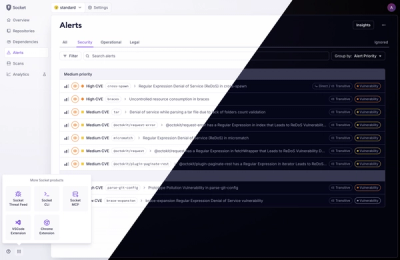
Product
A Fresh Look for the Socket Dashboard
We’ve redesigned the Socket dashboard with simpler navigation, less visual clutter, and a cleaner UI that highlights what really matters.
plv8ify bundles typescript/javascript input and writes SQL file(s) containing Postgres functions using PLV8.
npm install -g plv8ifyconst { point: turfPoint } = require('@turf/helpers')
export function point(lat, long) {
const pt = turfPoint([lat, long])
return pt
}
plv8ify generate./plv8-dist/plv8ify_point.plv8.sql (one for each exported function)./plv8-dist/plv8ify_point.plv8.sql using a Postgres clientSELECT plv8ify_point(52.5200,13.4050);See all examples in the examples folder. Use yarn examples to apply any changes to all the examples.
To generate a function to be deployed on a schema different than the default one (usually: public) decorate the function with a /** @plv8ify_schema_name <schemaname> */ jsdoc tag
/** @plv8ify_schema_name testschema */
export function hello() {
return 'world'
}
will generate
DROP FUNCTION IF EXISTS testschema.plv8ify_hello();
CREATE OR REPLACE FUNCTION testschema.plv8ify_hello() RETURNS text AS $plv8ify$
// input.ts
function hello() {
return "world";
}
return hello()
$plv8ify$ LANGUAGE plv8 IMMUTABLE STRICT;
To write a trigger function, decorate the function with a /** @plv8ify_trigger */ jsdoc tag, and have the function return a testRow type where testRow defines the type of the row for the trigger. You can also add a NEW parameter for insert and update triggers, and OLD for update and delete triggers.
(Tip: you can add @types/pg and @types/plv8-internals to get all standard postgres types/defines and plv8 specific functions recognized by the type checker)
type Row = {
// Either JS or plv8 types can be used here
id: number
event_name: string
event_date_time: Date
}
/** @plv8ify_trigger */
export function test(NEW: Row, OLD: Row): Row {
plv8.elog(NOTICE, 'NEW = ', JSON.stringify(NEW));
plv8.elog(NOTICE, 'OLD = ', JSON.stringify(OLD));
plv8.elog(NOTICE, 'TG_OP = ', TG_OP);
plv8.elog(NOTICE, 'TG_ARGV = ', TG_ARGV);
if (TG_OP === 'UPDATE') {
NEW.event_name = NEW.event_name ?? OLD.event_name
return NEW
}
if (TG_OP === 'INSERT') {
NEW.id = 102
return NEW
}
}
By default plv8ify converts typescript types to postgres types using the following map:
private _typeMap = {
number: 'float8',
string: 'text',
boolean: 'boolean',
}
and defaults all other types to either JSONB or the type passed in using the --fallback-type option
It is possible to define additional type mapping by using a custom file (by default types.ts) with the following format:
typeMap = {
test_type: 'test_type',
'test_type[]': 'test_type[]',
}
The custom types will be merged with the default ones at runtime and will allow using either internal postgres type or custom defined types
Example:
types.ts
typeMap = {
test_type: 'test_type',
'test_type[]': 'test_type[]',
}
input.ts
interface test_type {
name: string
age: number
}
export function hello(test: test_type[]) {
return {
name: `Hello ${test[0].name}`,
age: test[0].age,
}
}
cli command line:
plv8ify generate input.ts --types-config-file types.ts
will generate this function:
DROP FUNCTION IF EXISTS plv8ify_hello(test test_type[]);
CREATE OR REPLACE FUNCTION plv8ify_hello(test test_type[]) RETURNS JSONB AS $plv8ify$
// input.ts
function hello(test) {
return {
name: `Hello ${test[0].name}`,
age: test[0].age
};
}
return hello(test)
$plv8ify$ LANGUAGE plv8 IMMUTABLE STRICT;
Additionally, you can decorate your functions with special jsdoc tags to control the type mapping of params and return types on a per function basis:
Example:
input.ts
/**
* @plv8ify_param {varchar(255)} first_name
* @plv8ify_param {text} last_name
* @plv8ify_return {char(255)}
*/
export function howdy(first_name: string, last_name: string): string {
return `Howdy ${first_name} ${last_name}`
}
cli command line:
plv8ify generate input.ts
will generate this function:
DROP FUNCTION IF EXISTS howdy(first_name varchar(255),last_name text);
CREATE OR REPLACE FUNCTION howdy(first_name varchar(255),last_name text) RETURNS char(255) AS $plv8ify$
// examples/hello-custom-type/input.ts
function hello(test) {
return {
name: `Hello ${test[0].name}`,
age: test[0].age
};
}
function howdy(first_name, last_name) {
return `Howdy ${first_name} ${last_name}`;
}
return howdy(first_name,last_name)
$plv8ify$ LANGUAGE plv8 IMMUTABLE STRICT;
| Behavior | JSDoc Tag | Example |
|---|---|---|
| set the volatility of the generated Postgres function | /** @plv8ify_volatility <STABLE,IMMUTABLE,VOLATILE> */ | /** @plv8ify_volatility STABLE */ |
| set the schema of the generated Postgres function | /** @plv8ify_schema_name <schemaname> */ | /** @plv8ify_schema_name my_schema */ |
| set the TS->SQL type mapping for a parameter | /** @plv8ify_param {<my_sql_type>} <my_param> */ | /** @plv8ify_param {timestamptz} ts */ |
| set the TS->SQL type mapping for the return type | /** @plv8ify_returns {<SQL TYPE>} */ | /** @plv8ify_returns {setof my_table} */ |
| designate the function is a TRIGGER | /** @plv8ify_trigger */ | /** @plv8ify_trigger */ |
Print the version
| Generate Command Flags | Type | Description | Default |
|---|
Generate PLV8 functions for an input typescript file
| Generate Command Flags | Type | Description | Default |
|---|---|---|---|
| --debug | Boolean | Print additional debug information | false |
| --bundler | 'esbuild' or 'bun' | Pick bundler. Bun runtime is needed for 'bun' | esbuild |
| --write-bundler-output | Boolean | Write the intermediate bundled Javascript output from bundler (currently, only ESBuild interface exists) | false |
| --input-file | String | Specify an input file path (only Typescript supported at the moment) | input.ts |
| --output-folder | String | Specify an output folder | plv8ify-dist |
| --scope-prefix | String | Specify a scope prefix, by default (empty string), adds provided string as prefix for exported typescript functions | plv8ify |
| --pg-function-delimiter | String | Specify a delimiter for the generated Postgres function | $plv8ify$ |
| --fallback-type | String | Specify a fallback type when plv8ify fails to map a detected Typescript type to a Postges type | JSONB |
| --mode | 'inline', 'bundle' or 'start_proc' | 'inline' will bundle the library in each function, both 'bundle' and 'start_proc' creates a {prefix}_init function that loads the library. 'bundle' adds a check to each function to call 'init' if required, whereas 'start_proc' is designed to be used with plv8.start_proc | inline |
| --volatility | 'IMMUTABLE' or 'STABLE' or 'VOLATILE' | Change the volatility of all the generated functions. To change volatility of a specific function use the jsdoc /** @plv8ify_volatility STABLE in the input typescript file (see examples/turf-js/input.ts). | IMMUTABLE |
| --types-config-file | String | Specify a custom types config file | types.ts |
Deploy an output folder to a Postgres database (defined by env var DATABASE_URL)
| Generate Command Flags | Type | Description | Default |
|---|---|---|---|
| --output-folder | String | Specify an output folder | plv8ify-dist |
| --deploy-concurrency | Number | Specify the maximum allowed deployment tasks to run in parallel | 10 |
If you want to reach out to me, please DM me on https://twitter.com/divyenduz or email me at mail at divyendusingh.com
FAQs
## Introduction
The npm package plv8ify receives a total of 78 weekly downloads. As such, plv8ify popularity was classified as not popular.
We found that plv8ify demonstrated a healthy version release cadence and project activity because the last version was released less than a year ago. It has 0 open source maintainers collaborating on the project.
Did you know?

Socket for GitHub automatically highlights issues in each pull request and monitors the health of all your open source dependencies. Discover the contents of your packages and block harmful activity before you install or update your dependencies.

Product
We’ve redesigned the Socket dashboard with simpler navigation, less visual clutter, and a cleaner UI that highlights what really matters.

Industry Insights
Terry O’Daniel, Head of Security at Amplitude, shares insights on building high-impact security teams, aligning with engineering, and why AI gives defenders a fighting chance.

Security News
MCP spec updated with structured tool output, stronger OAuth 2.1 security, resource indicators, and protocol cleanups for safer, more reliable AI workflows.